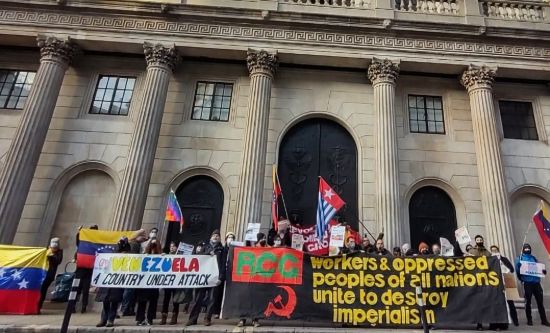
Despite the brutal impact of US sanctions, the pandemic and the global food and fuel crisis, Venezuela’s Bolivarian revolution has emerged defiant. After withstanding the ravages of hyperinflation and GDP contraction of 74% between 2012 and 2020, Venezuela has now experienced five consecutive quarters of growth.
The magnitude of suffering imposed on Venezuela cannot be overstated. Since 2014, US, British and EU coercive measures have strangled the Bolivarian revolution’s 20-year struggle to build socialism, severely undermining its ability to fund health, education and housing. Since 2017 an all-out blockade has decimated Venezuela’s oil industry, denying it diluents and spare parts, sanctioning cargo ships and insurance companies and imposing secondary sanctions on third countries and multinationals. Output plummeted from three million barrels per day (bpd) in 2012 to just 500,000 bpd in 2020. Measures to freeze Venezuela out of international credit and finance systems have left $7bn trapped in 40 international banks. Accumulated losses amounted to an estimated $240bn, devastating living standards. By 2018, 40,000 Venezuelans were estimated to have died due to the impact of the blockade on health care.
Yet Venezuela is fighting back. Credit Suisse predicts GDP growth could reach 20% this year. Oil production remains above 700,000 bpd. Foreign trade increased by 76% in 2021 and Venezuela’s Central Bank estimates that in 2022’s second quarter, the economy grew by 18.7% in the non-oil private sector alone. While the removal of currency controls resulted in a de facto devaluation of the Bolivar, the move undermined currency fraud, making largely redundant the wildly fluctuating unofficial exchange rates that contributed to hyperinflation. Monthly inflation has averaged 6.5% over the last year – a significant marker after four years of hyperinflation. Re-established trade with neighbouring Colombia is predicted to reach $2bn.
The ‘law of special economic zones’ (SEZ) passed in July seeks to attract foreign and national industry through incentives including tax relief, legal assurances and fast-tracking of contracts. Five initial zones along Venezuela’s coastline incorporate important industrial ports and tourism destinations. In August 3,000 tonnes of magnesite were produced in the Margarita port zone and shipped to Venezuela’s heavy industrial complex in Ciudad Guyana. Magnesite has been almost impossible to import due to sanctions, making domestic production crucial to sustaining the heavy manufacturing sector.
The SEZ law has prompted fierce debate, with some drawing comparisons with the exploitative Free Trade Zones in Mexico, Panama and Colombia, where cheap goods are produced for export with little benefit for the local population. Venezuela’s SEZ law in contrast seeks to develop production for domestic consumption; existing labour laws will still apply, with state-owned and communal enterprises operating alongside foreign and private capital. Clearly, there will be potential for exploitation as companies scramble to maximise profits; however as Oliver Rivas, a deputy from Somos Venezuela argues, the SEZs are a ‘resistance strategy’ rather than an ‘ultimate step’ towards socialism. Somos Venezuela is the newest party in the Great Patriotic Pole coalition, Venezuela’s Chavista electoral alliance. Socialist activist Jorge Vilalta told FRFI: ‘We are balancing the need to advance the communal project and build socialism with the reality of life under the blockade and the need to produce.’
Venezuela now produces more than 80% of the food it consumes. Large-scale agribusiness such as the Brazil-Venezuelan ‘Oro Blanco’ enterprise – which is expanding cultivation of soybean from 25,000 hectares to 100,000 hectares – have contributed to food exports reaching 260,000 tonnes this year. Venezuela has become self-sufficient in potato seed, whose import used to cost $600m a year. State-owned Pequiven can now meet domestic demand for fertiliser thanks to import substitutions in its nitrogen-producing urea catalysts. Small producers and communal organisations also play an important role. 6.5m hectares of idle land have been recovered since 2001, handing ownership to landless farmers and indigenous communities. Furthermore, food production is a central activity of many of Venezuela’s 3,640 communes and 40,640 communal productive organisations. A State Purchase Plan buys and distributes produce from these collectives, supplying it to the cities and strengthening participatory democracy and collective ownership. The rural class struggle continues as large landowners battle against land reform, evicting and murdering campesinos, as they seek to profit from the boom in agribusiness.
A battle is being waged over who benefits from economic recovery. Despite periodic wage rises, public sector salaries remain inadequate. In August, teachers protested against significant reductions to their annual vacation bonus. Teachers receive around $50 a month in wages and depend on bonuses and benefits in kind. Under popular pressure, the education ministry agreed to pay the full bonus and negotiate with unions to discuss wages. Meanwhile investment in public health, education and infrastructure in the barrios is sorely needed. To this end, civic-military brigades have begun renovating schools and health centres. The ‘1×10’ system of good government introduced in May continues to promote direct communication between state authorities, grassroots organisations and communities. President Nicolas Maduro has criticised local mayors and officials who rarely venture into working class communities, saying: ‘Where the incapable and the bureaucrats say that it cannot be done – it can be done. The capacity to build Bolivarian socialism is being demonstrated through the union of grassroots power and the Bolivarian National Armed Forces.’
Venezuela’s ruling socialist party (PSUV) is a cross-class alliance, containing powerful capitalists vying for lucrative state contracts alongside trade unionists, communal activists and social movement leaders. Only popular pressure from the working class and poor can hold the Venezuelan government to account, ensuring the economy does not recover at their expense. The level of participation in grassroots elections for PSUV’s ‘Battle Units’ illustrates their determination. In August three million PSUV members participated in 266,927 street assemblies, ratifying 14,095 units and electing speakers and coordinators. Of those elected, 57% are new in post and 79% are women. Despite the contradictions Venezuela faces, the PSUV and allied social movements retain popular support, driving the Bolivarian revolution forward.
Sam McGill
Fight Racism! Fight Imperialism! No 290, October/November 2022




